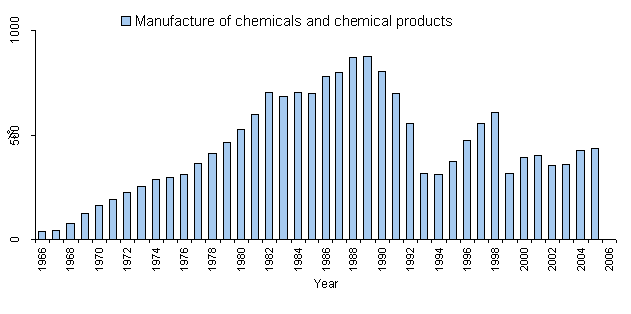|
Chemical
Industry
The chemical industry of Serbia experienced three fruitful periods
- the first one during the 1960's when most of the basic inorganic
capacities were brought on-stream, the second one between 1975
and 1982 when efforts were focused on the development of the
basic petrochemical industry and the third one between 1987
and 1990 when the record levels of production and demand were
achieved. At the end of the 1980's the production program of
national chemical industry included 7-8 thousand of various
chemical goods in global scope of 8-10 million tons.
The last decade of the 20th century was especially hard period
for the chemical industry of Serbia. It started with the consequences
of the former Yugoslavia disintegration, such as reduction of
the domestic market and lack of several important intermediate
products that had been manufactured in Croatia, Slovenia, Bosnia
and Macedonia. Further problems were brought by the civil war
in Croatia and Bosnia and the imposing of the UN trade sanctions
against the new Yugoslavia. The production volume of chemical
goods in 1998 was at 35% of the level achieved in 1989. Troubles
escalated in the early spring of 1999 with NATO aggression against
Serbia. During the 78 days of NATO bombing campaign the several
large-scale chemical plants located in Pancevo, Lucani and Baric
were almost completely destroyed. Especially significant financial
and ecological damage has been made in the town of Pancevo,
where chlorine, vinyl chloride (VCM), polyvinyl chloride (PVC)
and ammonia plants were bombed and badly ruined.
Historical
Development of Production: Chemicals and Chemical Products
(by manufactured volumes from 1966 to 2005, based on 1945=0%)

The chemical industry
plays a very important role in the Serbia's economy
and foreign trade achievements. Its share in gross domestic
product of the overall industry of Serbia is approximately 11%,
or together with industry of rubber & plastic products 14-15%.
In 1998 the values of import and export of chemical goods were
744 million $ and 322 million $ respectively. In 1999, as a
consequence of the above-mentioned circumstances, the national
chemical industry's turnover and the value of export were split
and its value of import reduced by 30%. The export achievements
from 1998 were not over-passed until 2004 when exports of chemicals
& chemical products reached the value of 384.7 million $,
or together with exports of rubber & plastic goods the value
of over 550 million $. What is more important, already in next
2005 those values were 494.6 million $ and almost 700 million
$.
Many local chemical companies have already been privatized –
most of them have been acquired by domestic managers. However,
there are several world-known chemical companies (Henkel, Messer,
Linde…) that already entered into Serbian market by acquisition
of the local enterprises.
|